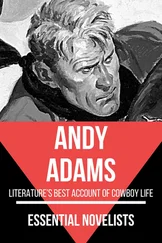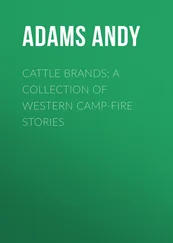Andy Adams - Reed Anthony, Cowman - An Autobiography
Здесь есть возможность читать онлайн «Andy Adams - Reed Anthony, Cowman - An Autobiography» — ознакомительный отрывок электронной книги совершенно бесплатно, а после прочтения отрывка купить полную версию. В некоторых случаях можно слушать аудио, скачать через торрент в формате fb2 и присутствует краткое содержание. Жанр: Биографии и Мемуары, foreign_antique, foreign_prose, на английском языке. Описание произведения, (предисловие) а так же отзывы посетителей доступны на портале библиотеки ЛибКат.
- Название:Reed Anthony, Cowman: An Autobiography
- Автор:
- Жанр:
- Год:неизвестен
- ISBN:нет данных
- Рейтинг книги:4 / 5. Голосов: 1
-
Избранное:Добавить в избранное
- Отзывы:
-
Ваша оценка:
- 80
- 1
- 2
- 3
- 4
- 5
Reed Anthony, Cowman: An Autobiography: краткое содержание, описание и аннотация
Предлагаем к чтению аннотацию, описание, краткое содержание или предисловие (зависит от того, что написал сам автор книги «Reed Anthony, Cowman: An Autobiography»). Если вы не нашли необходимую информацию о книге — напишите в комментариях, мы постараемся отыскать её.
Reed Anthony, Cowman: An Autobiography — читать онлайн ознакомительный отрывок
Ниже представлен текст книги, разбитый по страницам. Система сохранения места последней прочитанной страницы, позволяет с удобством читать онлайн бесплатно книгу «Reed Anthony, Cowman: An Autobiography», без необходимости каждый раз заново искать на чём Вы остановились. Поставьте закладку, и сможете в любой момент перейти на страницу, на которой закончили чтение.
Интервал:
Закладка:
Yet Allen died in Texas. There was a charm in the frontier that held men captive. I always promised myself to return to Virginia to spend the declining years of my life, but the fulfillment never came. I can now realize how idle was the expectation, having seen others make the attempt and fail. I recall the experience of an old cowman, laboring under a similar delusion, who, after nearly half a century in the Southwest, concluded to return to the scenes of his boyhood. He had made a substantial fortune in cattle, and had fought his way through the vicissitudes of the frontier until success crowned his efforts. A large family had in the mean time grown up around him, and under the pretense of giving his children the advantages of an older and established community he sold his holdings and moved back to his native borough. Within six months he returned to the straggling village which he had left on the plains, bringing the family with him. Shortly afterwards I met him, and anxiously inquired the cause of his return. "Well, Reed," said he, "I can't make you understand near as well as though you had tried it yourself. You see I was a stranger in my native town. The people were all right, I reckon, but I found out that it was me who had changed. I tried to be sociable with them, but honest, Reed, I just couldn't stand it in a country where no one ever asked you to take a drink."
A week was spent in crossing the country between the Concho and Brazos rivers. Not a day passed but Indian trails were cut, all heading southward, and on a branch of the Clear Fork we nearly ran afoul of an encampment of forty teepees and lean-tos, with several hundred horses in sight. But we never varied our course a fraction, passing within a quarter mile of their camp, apparently indifferent as to whether they showed fight or allowed us to pass in peace. Our bluff had the desired effect; but we made it an object to reach Fort Griffin near midnight before camping. The Comanche and his ally were great respecters, not only of their own physical welfare, but of the Henri and Spencer rifle with which the white man killed the buffalo at the distance of twice the flight of an arrow. When every advantage was in his favor—ambush and surprise—Lo was a warrior bold; otherwise he used discretion.
CHAPTER IV
A FATAL TRIP
Before leaving Fort Sumner an agreement had been entered into between my employers and the contractors for a third herd. The delivery was set for the first week in September, and twenty-five hundred beeves were agreed upon, with a liberal leeway above and below that number in case of accident en route. Accordingly, on our return to Loving's ranch active preparations were begun for the next drive. Extra horses were purchased, several new guns of the most modern make were secured, and the gathering of cattle in Loving's brand began at once, continuing for six weeks. We combed the hills and valleys along the main Brazos, and then started west up the Clear Fork, carrying the beeves with us while gathering. The range was in prime condition, the cattle were fat and indolent, and with the exception of Indian rumors there was not a cloud in the sky.
Our last camp was made a few miles above Fort Griffin. Military protection was not expected, yet our proximity to that post was considered a security from Indian interference, as at times not over half the outfit were with the herd. We had nearly completed our numbers when, one morning early in July, the redskins struck our camp with the violence of a cyclone. The attack occurred, as usual, about half an hour before dawn, and, to add to the difficulty of the situation, the cattle stampeded with the first shot fired. I was on last guard at the time, and conscious that it was an Indian attack I unslung a new Sharp's rifle and tore away in the lead of the herd. With the rumbling of over two thousand running cattle in my ears, hearing was out of the question, while my sense of sight was rendered useless by the darkness of the morning hour. Yet I had some very distinct visions; not from the herd of frenzied beeves, thundering at my heels, but every shade and shadow in the darkness looked like a pursuing Comanche. Once I leveled my rifle at a shadow, but hesitated, when a flash from a six-shooter revealed the object to be one of our own men. I knew there were four of us with the herd when it stampeded, but if the rest were as badly bewildered as I was, it was dangerous even to approach them. But I had a king's horse under me and trusted my life to him, and he led the run until breaking dawn revealed our identity to each other.
The presence of two other men with the running herd was then discovered. We were fully five miles from camp, and giving our attention to the running cattle we soon turned the lead. The main body of the herd was strung back for a mile, but we fell on the leaders right and left, and soon had them headed back for camp. In the mean time, and with the breaking of day, our trail had been taken up by both drovers and half a dozen men, who overtook us shortly after sun-up. A count was made and we had every hoof. A determined fight had occurred over the remuda and commissary, and three of the Indians' ponies had been killed, while some thirty arrows had found lodgment in our wagon. There were no casualties in the cow outfit, and if any occurred among the redskins, the wounded or killed were carried away by their comrades before daybreak. All agreed that there were fully one hundred warriors in the attacking party, and as we slowly drifted the cattle back to camp doubt was expressed by the drovers whether it was advisable to drive the herd to its destination in midsummer with the Comanches out on their old hunting grounds.
A report of the attack was sent into Griffin that morning, and a company of cavalry took up the Indian trail, followed it until evening, and returned to the post during the night. Approaching a government station was generally looked upon as an audacious act of the redskins, but the contempt of the Comanche and his ally for citizen and soldier alike was well known on the Texas frontier and excited little comment. Several years later, in broad daylight, they raided the town of Weatherford, untied every horse from the hitching racks, and defiantly rode away with their spoil. But the prevailing spirits in our camp were not the kind to yield to an inferior race, and, true to their obligation to the contractors, they pushed forward preparations to start the herd. Within a week our numbers were completed, two extra men were secured, and on the morning of July 14, 1867, we trailed out up the Clear Fork with a few over twenty-six hundred big beeves. It was the same old route to the southwest, there was a decided lack of enthusiasm over the start, yet never a word of discouragement escaped the lips of men or employers. I have never been a superstitious man, have never had a premonition of impending danger, always rather felt an enthusiasm in my undertakings, yet that morning when the flag over Fort Griffin faded from our view, I believe there was not a man in the outfit but realized that our journey would be disputed by Indians.
Nor had we long to wait. Near the juncture of Elm Creek with the main Clear Fork we were again attacked at the usual hour in the morning. The camp was the best available, and yet not a good one for defense, as the ground was broken by shallow draws and dry washes. There were about one hundred yards of clear space on three sides of the camp, while on the exposed side, and thirty yards distant, was a slight depression of several feet. Fortunately we had a moment's warning, by several horses snorting and pawing the ground, which caused Goodnight to quietly awake the men sleeping near him, who in turn were arousing the others, when a flight of arrows buried themselves in the ground around us and the war-whoop of the Comanche sounded. Ever cautious, we had studied the situation on encamping, and had tied our horses, cavalry fashion, to a heavy rope stretched from the protected side of the wagon to a high stake driven for the purpose. With the attack the majority of the men flung themselves into their saddles and started to the rescue of the remuda, while three others and myself, detailed in anticipation, ran for the ravine and dropped into it about forty yards above the wagon. We could easily hear the exultations of the redskins just below us in the shallow gorge, and an enfilade fire was poured into them at short range. Two guns were cutting the grass from underneath the wagon, and, knowing the Indians had crept up the depression on foot, we began a rapid fire from our carbines and six-shooters, which created the impression of a dozen rifles on their flank, and they took to their heels in a headlong rout.
Читать дальшеИнтервал:
Закладка:
Похожие книги на «Reed Anthony, Cowman: An Autobiography»
Представляем Вашему вниманию похожие книги на «Reed Anthony, Cowman: An Autobiography» списком для выбора. Мы отобрали схожую по названию и смыслу литературу в надежде предоставить читателям больше вариантов отыскать новые, интересные, ещё непрочитанные произведения.
Обсуждение, отзывы о книге «Reed Anthony, Cowman: An Autobiography» и просто собственные мнения читателей. Оставьте ваши комментарии, напишите, что Вы думаете о произведении, его смысле или главных героях. Укажите что конкретно понравилось, а что нет, и почему Вы так считаете.












